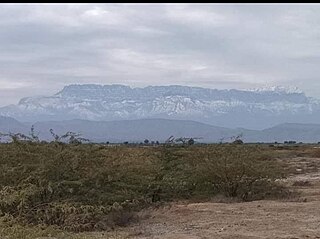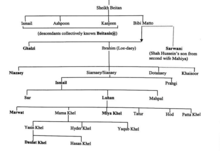
Babur was the founder of the Mughal Empire in the Indian subcontinent. He was a descendant of Timur and Genghis Khan through his father and mother respectively. He was also given the posthumous name of Firdaws Makani.

The First Battle of Panipat, on 21 April 1526 was fought between the invading forces of Babur and the Lodi dynasty. It took place in North India and marked the beginning of the Mughal Empire and the end of the Delhi Sultanate. This was one of the earliest battles involving gunpowder firearms and field artillery in the Indian subcontinent which were introduced by Mughals in this battle.

Ibrahim Khan Lodi was the last Sultan of the Delhi Sultanate, who became Sultan in 1517 after the death of his father Sikandar Khan Lodi. He was the last ruler of the Lodi dynasty, reigning for nine years until 1526, when he was defeated and killed at the Battle of Panipat by Babur's invading army, giving way to the emergence of the Mughal Empire in India.

The North-West Frontier Province was a province of British India from 1901 to 1947, of the Dominion of Pakistan from 1947 to 1955, and of the Islamic Republic of Pakistan from 1970 to 2010. It was established on 9 November 1901 from the north-western districts of the British Punjab, during the British Raj. Following the referendum in 1947 to join either Pakistan or India, the province voted hugely in favour of joining Pakistan and it acceded accordingly on 14 August 1947. It was dissolved to form a unified province of West Pakistan in 1955 upon promulgation of One Unit Scheme and was reestablished in 1970. It was known by this name until 19 April 2010, when it was dissolved and redesignated as the province of Khyber Pakhtunkhwa following the passing of the Eighteenth Amendment to the Constitution of Pakistan, by erstwhile President Asif Ali Zardari.

Sher Shah Suri, often called the "Just King", was the founder of the Sur Empire in India. He was the regent and later sole ruler of Bihar from 1529—1540 until he defeated the Mughal Empire in 1540, founding the Sur Empire, and establishing his rule in Delhi, crowning himself as Emperor. After his accidental death in 1545 CE, his son Islam Shah became his successor. The influence of his innovations and reforms extended far beyond his brief reign. In his reign, he remained undefeated in battle, being renowned as one of the most skillful Afghan generals ever produced.

The Bangash, Bungish, Bangaš or Bangakh are a tribe of Pashtuns, inhabiting their traditional homeland, the Bangash territory which stretches from Kohat to Tall in Hangu and Spīn Ghar kurram in Khyber Pakhtunkhwa, Pakistan. They also live as a smaller population in Dera Ismail Khel, Bannu while also a smaller population of Bangash inhabit Gardez, Paktia, Afghanistan.
The Marwat is a Pashtun tribe, a branch of the Lohani tribe and belong to Lodi section. The Marwats were named for their ancestor Marwat Khan Lodi.

Lodi is a Pashtun tribe from the Ghilji group of Pashtuns. In mythical genealogy, they have also been considered as being part of the Bettani tribal confederacy. The Lodi tribe consists of many sub-tribes, most of whom are now settled in the Tank, Frontier Region Tank, Lakki Marwat and Dera Ismail Khan districts of Khyber Pakhtunkhwa province of modern-day Pakistan. These tribes were nomadic for most of their existence and migrated to their present-day locations by crossing the Gomal Pass throughout different times in history.
Derajat, the plural of the word 'dera', is a cultural region of central Pakistan, located in the region where the provinces of Punjab, Khyber Pakhtunkhwa, and Balochistan meet. Derajat is bound by the Indus River to the east, and the Sulaiman Mountains to the west.

The Lodi dynasty was a dynasty that ruled the Delhi Sultanate from 1451 to 1526. It was the fifth and final dynasty of the Delhi Sultanate, and was founded by Bahlul Khan Lodi when he replaced the Sayyid dynasty.

Lakki Marwat or Lakki is the headquarters of Lakki Marwat District in Khyber Pakhtunkhwa province of Pakistan. Lakki Marwat has become one of the fastest growing cities in Khyber Pakhtunkhwa. Lakki Marwat is also the 20th most populous city in the province of Khyber Pakhtunkhwa.

The Mianwali District is a district located in the Mianwali division of the Punjab province of Pakistan.

Hasan Abdal, is a city in the Attock District of Punjab Province in Pakistan, located 40 km northwest of the country's capital city, Islamabad. Hassan Abdal is the headquarters of Hasan Abdal Tehsil (sub-district).

The Battle of Ghaghra, fought in 1529, was a great battle for the conquest of India by the Mughal Empire. It followed the first Battle of Panipat in 1526 and the Battle of Khanwa in 1527. The forces of Mughal Emperor Babur of the emerging Mughal Empire were joined by Indian allies in battle against the Eastern Afghan Confederates under Sultan Mahmud Lodi and Sultanate of Bengal under Sultan Nusrat Shah.

Chakar Khan Rind (1468–1565) was a Baloch chieftain who founded the Second Baloch Confederacy (1487–1512). He also aided Mughal Emperor Humayun in his reconquest of the Subcontinent. He is considered a folk hero of the Baloch people and an important figure in the Baloch epic Hani and Sheh Mureed.

The Bettani, also spelled Batani, Baittani or Bhittani, is a Pashtun tribe located mostly in Afghanistan and Pakistan. The Bettani are named after Shaykh Beṭ, their legendary ancestor, who is said to be the third and last son of Qais Abdur Rashid.

Daraban is a tehsil located in Dera Ismail Khan District, Khyber Pakhtunkhwa, Pakistan. It is located at 31°44'3N 70°20'11E and has an altitude of 221 metres (725 ft). Daraban is a small town which lies 40 miles (64 km) west of Dera Ismail khan in the foothills of Sulaiman Mountains. Daraban region has a rich, fascinating history. Over the last two decades or so, Daraban has seen massive growth, becoming a vibrant hub of local trade and business.This has led to influx of economic migrants from neighboring villages, who have begin to settle in outskirts of Daraban, causing an increase in Town's population. Daraban enjoys excellent geographical condition, it lies on major national highway connecting Khyber Pakhtunkhuwa and Punjab with eastern parts of Balochistan.The town recent history includes events like high profile insurgent led attack on Draban's police station which led to deaths of 23 security personnels. This was only occasion when town gained media attention in Pakistan and abroad. December 12,2023 attack and more recent one in Chaudwan on February 5,2024 reflect heightened security threats in the region.
The Karrani dynasty was founded in 1564 by Taj Khan Karrani, an ethnic Afghan from the Karlani tribe, hailing from Bangash district. It was the last dynasty to rule the Sultanate of Bengal.

Tatur, also known as Tator or Tatoor, is a small Pashtun tribe among the larger Lodi/Lohani tribe. They were nomads for most of their existence before settling in the Gomal plains of present-day Tank District in modern-day Pakistan during the late 1500s, moving into the region through the Gomal Pass.















